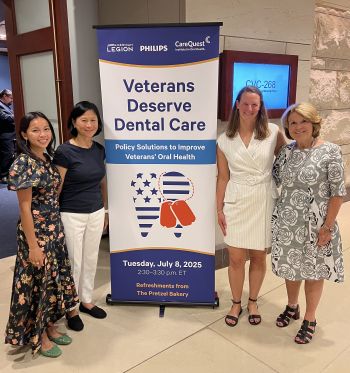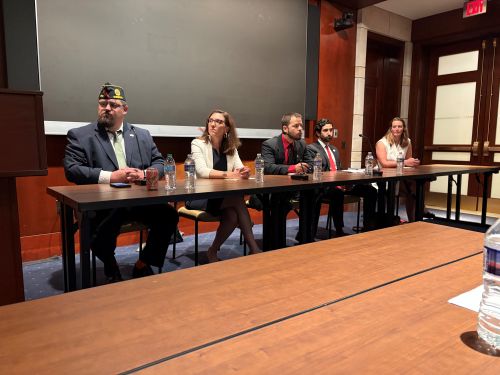Enter your email to receive the CareQuest newsletter:
July 15, 2025
By Caroline Le, CareQuest Institute Public Policy Analyst

Pam Reeve at Veterans Deserve Dental Care event
For far too many veterans, dental care is unaffordable and out of reach. Gaps in dental benefits and difficulty finding providers push many veterans to go without care — or to extreme lengths to get it.
That’s why CareQuest Institute is leading efforts to educate policymakers and drive awareness of these gaps in care.
Last week, CareQuest Institute, The American Legion, and Philips Healthcare cohosted a Capitol Hill briefing — Veterans Deserve Dental Care: Policy Solutions to Improve Veterans’ Oral Health. The goal of the briefing was to engage policymakers and veteran advocates in a discussion spotlighting the oral health challenges veterans face, share data and lived experiences, and explore policy solutions to improve access to care for those who have served.
During the event, a panel of experts emphasized that millions of veterans suffer from higher rates of chronic disease and a diminished quality of life because they lack access to affordable dental care and often delay or forgo care entirely. The panel included an array of perspectives from national organizations, community advocates, and local providers:

- Eric Johnson from The American Legion outlined current Veterans Affairs (VA) dental eligibility criteria, noting that typically, only those who are 100% service-connected disabled or meet special conditions (like being a former prisoner of war) qualify for dental care. He shared his own experience receiving care through the VA, highlighting both the progress made and the persistent gaps that leave many veterans behind. The American Legion supports policy changes that would enable the VA to extend oral health care to all veterans, acknowledging that such reforms may need to be phased in over time.
- Matina Vidalis from Philips Healthcare discussed how private sector partners can play a role in improving preventive care and access to oral health resources. She shared Philips’ longstanding partnership with the VA and highlighted opportunities for collaboration if dental benefits were expanded.
- Frank Lombard from Upper Peninsula Commission for Area Progress shared insights from his work assessing veterans’ oral health needs in his community in the Upper Peninsula of Michigan — a very rural area with a high proportion of veterans. He pointed to barriers like being ineligible for VA dental care, lack of transportation, and limited provider availability as major obstacles to veterans getting the dental care they need, forcing some to resort to dangerous measures like pulling out their own teeth at home.
- John Decarvalho from Union Community Health Center described how Federally Qualified Health Centers (FQHCs) are stepping in to fill some of the gaps for veterans, offering critical services but still facing resource constraints that limit their reach. He noted that other FQHCs may lack strong relationships with the VA, which creates challenges in referrals and day-to-day coordination of care. He emphasized the need for federal policy support to better integrate FQHCs as natural partners in the veterans’ care system and to expand access to dental services for veterans.
The discussion concluded with a call to action, urging policymakers and advocates to stay engaged and keep veterans’ oral health at the forefront of policy conversations.
Editor’s Note: To learn more about CareQuest Institute’s efforts to elevate the importance of veterans’ oral health and work with others to come up with solutions, go to carequest.org/veteran-oral-health.